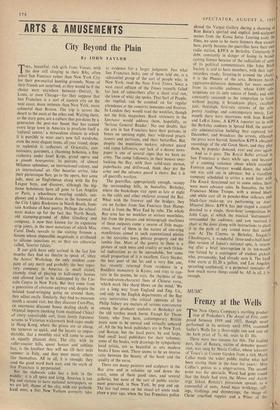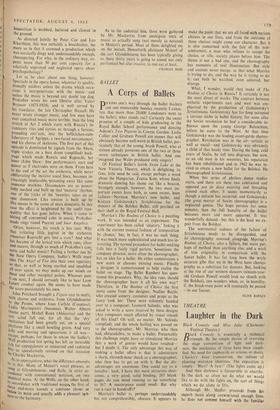MUSIC Frenzy at the Wells
1117. New Opera Company's startling produc- tion of Prokofiev's The Angel of Fire, com- posed between 1919 and 1927, though never performed in its entirety until 1954, crammed Sadler's Wells for a three-night run and sent up the kerb price of 7s. 6d. seats to El 10s.
There were two reasons for this. The leading part, that of Renata, victim of demonic posses- sion, was sung by Marie Collier, whose takeover of Tosca's at Covent Garden from a sick Maria Callas made the wider public realise what had been staring them in the 'face for years: Miss Collier's genius as a singer-actress. The second point was the spectacle. Word had gone round that the finale had even the Moses and Aaron orgy licked. Renata's possession spreads to a conventful of nuns. Amid mass writhings, roll: ings, frothings and shimmyings, the image 01 Christ crucified topples and a Priest of the Inquisition is mobbed, battered and clawed to the ground.
As directed jointly by Peter Coe and Leo Kharibian, this was certainly a breathtaker, the more so in that it crowned a production which was scenically dingy and, understandably enough, cheeseparing. For who, in the ordinary way, ex- pects more than 50 per cent capacity for a relatively unproved and neglected opera about psychopathology?
Let us be clear about one thing, however. Spectacle in the opera house, whatever its quality, dismally misfires unless the drama which occa- sions it interpenetrates with the music—and unless the music is beyond any doubt top dog.
Prokofiev wrote his own libretto after Valeri Bryusov (1873-1924), and is well served by his translator, the late Christopher Hassall. He never wrote stronger music, and few men have ever conceived music more terrible, than the long stretch in Act 2 which starts with Renata's in-
cantatory rites and carries us through a furious, Pounding entr'acte, into the hellkitchen-cum- laboratory of Agrippa, a two-faced necromancer, and his chorus of skeletons. The first part of this episode is dominated by signals from the Abyss, triple strokes on a bass drum (amplified) back- stage which made Renata and Ruprecht, her lover (John Shaw : fine performance), start and quiver as if electrodes were on them. From here to the end of the act the orchestra, while never obliterating the incisive vocal lines, becomes in- creasingly implacable, Tistoning away like some immense machine. Dissonances are so power- fully meshed and built up that `motorie rhythm, one of the tricks of the 'twenties, takes on an epic dimension. Like tension is built up by like means in the scene of mass dementia. In this case the effect is heightened by the sunlit tran- quillity that has gone before. When it came to hitting off conventual calm in music, Prokofiev made rings round Puccini and Suor Angelica.
Often, however, his touch is less sure. Why that irritating little, jogtrot in the orchestra whenever Ruprecht gets into a state? And what has become of the lyrical vein which runs, silver and mauve, through so much of Prokofiev's con; certo and ballet music? Failing a further run by the NeW Opera Company, Sadler's Wells must take The Angel of Fire into their own repertory• so that, as well as being startled and unedified all over again, we may make up our minds on these and other marginal points. Whoever puts it on next, ,I should certainly like to hear Leon Lovett conduct again. He seems to have made the score passionately his own.
John Pritchard brought a Figaro cast in mufti, With chorus and orchestra, from Glyndebourne to the Proms, where Joan Carlyle (Countess), LYdia 'Marimpietri (Susanna), Walter Alberti (name part), Michel Roux (Althaviva) and the rest acted full out, for all that the 'dry' recitatives had been greatly cut, on a special Platform like a_ small bowling green. And very lolly and moving and uproarious it all was— except, perhaps, for those in whom the Sadler's .Well production last spring has left an incurable itch for appoggiature as reinserted and cadential bits as speculatively revived on that occasion by Charles Mackerras.
As to appoggiature, what the difference amounts '0 is this. Many of Mozart's vocal phrases, as sung at Glyndebourne. end flatly, in strict ac- cordance with conventional notation, on two identical notes. At the Wells, on the other hand, In accordance with traditional usage, the first of these end-notes sounds a semitone above or below its mate and usually adds a pleasant tart- ness to the harmony. As to the cadential bits, these, were gathered by Mr. Mackerras from analogous texts of music as actually sung (not merely as notated) in Mozart's period. Most of them delighted me on the instant. Henceforth plainjane Mozart. of the sort Glyndebourne has been typically giving us these thirty years is going to sound not only puritanical but also evasive, to one ear at least.
CHARLES REID































 Previous page
Previous page